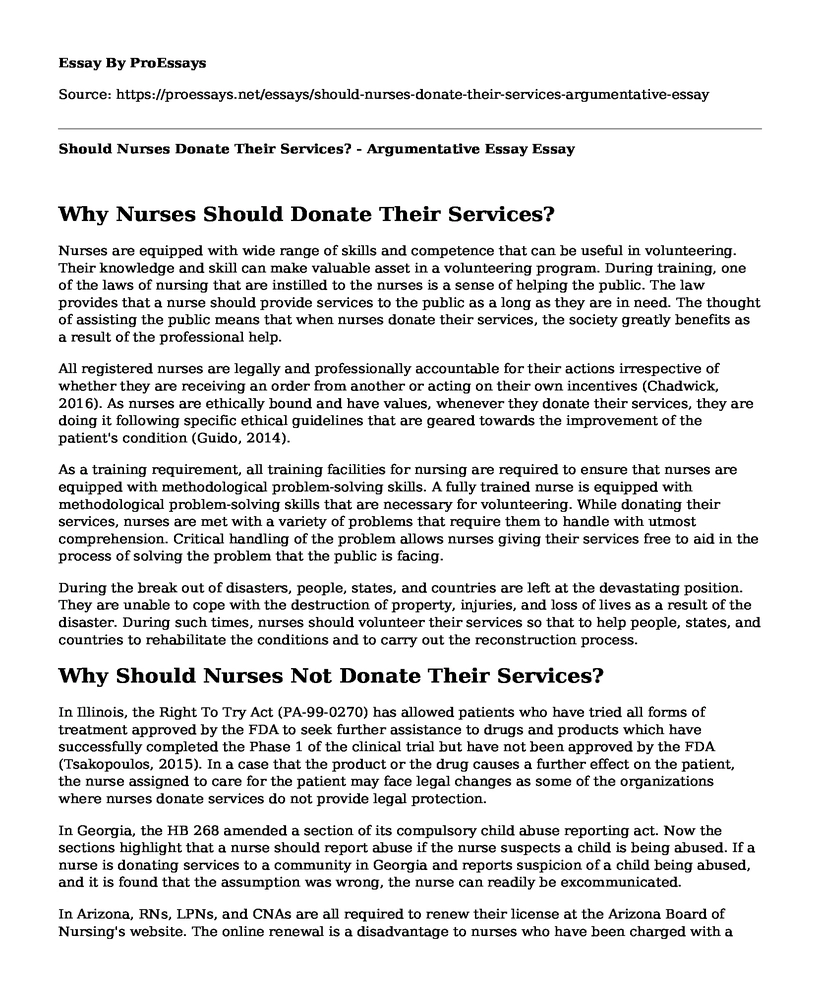Why Nurses Should Donate Their Services?
Nurses are equipped with wide range of skills and competence that can be useful in volunteering. Their knowledge and skill can make valuable asset in a volunteering program. During training, one of the laws of nursing that are instilled to the nurses is a sense of helping the public. The law provides that a nurse should provide services to the public as a long as they are in need. The thought of assisting the public means that when nurses donate their services, the society greatly benefits as a result of the professional help.
All registered nurses are legally and professionally accountable for their actions irrespective of whether they are receiving an order from another or acting on their own incentives (Chadwick, 2016). As nurses are ethically bound and have values, whenever they donate their services, they are doing it following specific ethical guidelines that are geared towards the improvement of the patient's condition (Guido, 2014).
As a training requirement, all training facilities for nursing are required to ensure that nurses are equipped with methodological problem-solving skills. A fully trained nurse is equipped with methodological problem-solving skills that are necessary for volunteering. While donating their services, nurses are met with a variety of problems that require them to handle with utmost comprehension. Critical handling of the problem allows nurses giving their services free to aid in the process of solving the problem that the public is facing.
During the break out of disasters, people, states, and countries are left at the devastating position. They are unable to cope with the destruction of property, injuries, and loss of lives as a result of the disaster. During such times, nurses should volunteer their services so that to help people, states, and countries to rehabilitate the conditions and to carry out the reconstruction process.
Why Should Nurses Not Donate Their Services?
In Illinois, the Right To Try Act (PA-99-0270) has allowed patients who have tried all forms of treatment approved by the FDA to seek further assistance to drugs and products which have successfully completed the Phase 1 of the clinical trial but have not been approved by the FDA (Tsakopoulos, 2015). In a case that the product or the drug causes a further effect on the patient, the nurse assigned to care for the patient may face legal changes as some of the organizations where nurses donate services do not provide legal protection.
In Georgia, the HB 268 amended a section of its compulsory child abuse reporting act. Now the sections highlight that a nurse should report abuse if the nurse suspects a child is being abused. If a nurse is donating services to a community in Georgia and reports suspicion of a child being abused, and it is found that the assumption was wrong, the nurse can readily be excommunicated.
In Arizona, RNs, LPNs, and CNAs are all required to renew their license at the Arizona Board of Nursing's website. The online renewal is a disadvantage to nurses who have been charged with a felony, convicted of a crime, and those who are either inactive or retired nurses (Johnson, 2016). The disadvantage comes in because they are not allowed to register online. Some of the nurses donating their services are either inactive or retired, or previously convicted of a felony. While giving their services, these nurses are not recognized as individuals who have been allowed to offer any medical assistance to patients. In case of law enforcement coming across the nurse donating services in Arizona, they can be easily charged with practice nursing activity without a license or a certificate of approval from the Arizona Board of Nursing. The organization accommodating the nurses can also be held accountable.
References
Chadwick, R. &. (2016). Ethics and nursing practice. Palgrave Macmillan.
Guido, G. (2014). Legal and Ethical Issues in Nursing. Upper Saddle River: Prentice Hall.
Johnson, W. G. (2016). Registered Nurses: The Curious Case of a Persistent Shortage. Journal of Nursing Scholarship, 387-396.
Tsakopoulos, A. H. (2015). The right to try: an overview of efforts to obtain expedited access to unapproved treatment for the terminally ill. Food and Druds LJ, 70-71.
Cite this page
Should Nurses Donate Their Services? - Argumentative Essay. (2022, Apr 19). Retrieved from https://proessays.net/essays/should-nurses-donate-their-services-argumentative-essay
If you are the original author of this essay and no longer wish to have it published on the ProEssays website, please click below to request its removal:
- Environmental Impact of Personal Lifestyle Essay Example
- Essay Sample on Role of Epidemiology in Public Health
- Article Analysis Essay on Spirituality in Nursing
- Proposal to Reduce Organ Shortage and Curb the Organ Black Market
- Speech Example on Few Male Nurses: Examining the Controversy
- Essay Sample on Revolutionizing Healthcare: Less Waste, More Value, Better Outcomes
- Leadership Practices on Nurse Retention - Research Paper Sample







